AWM41 979 - [Nurses Narratives] Sister M E Hall - Part 1
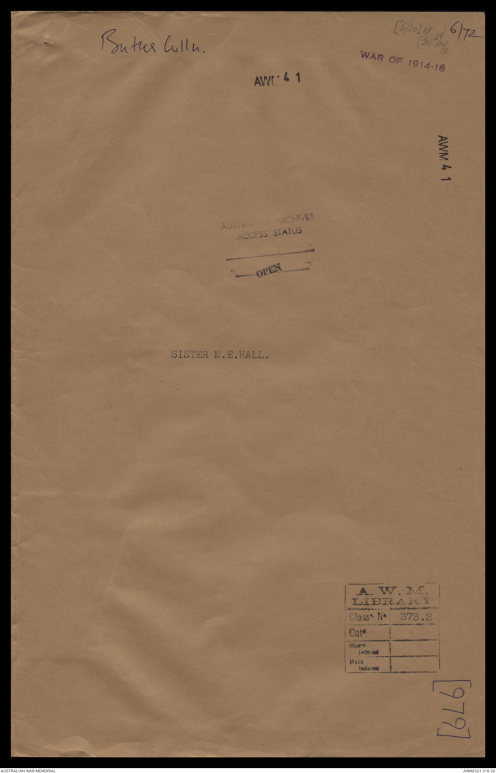
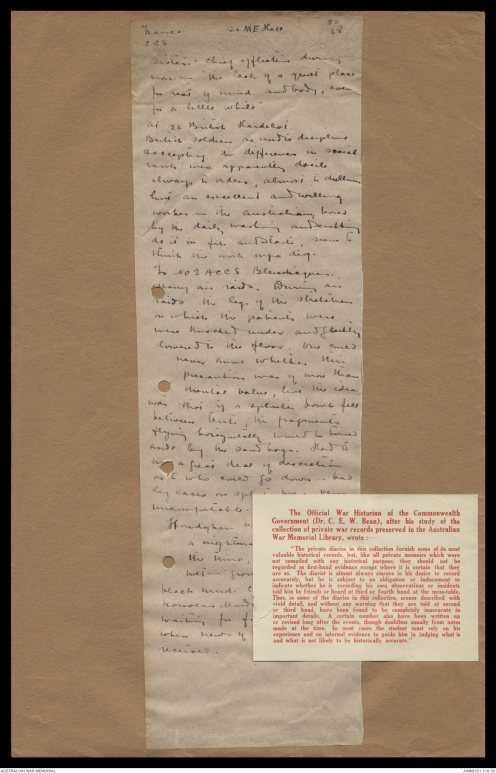
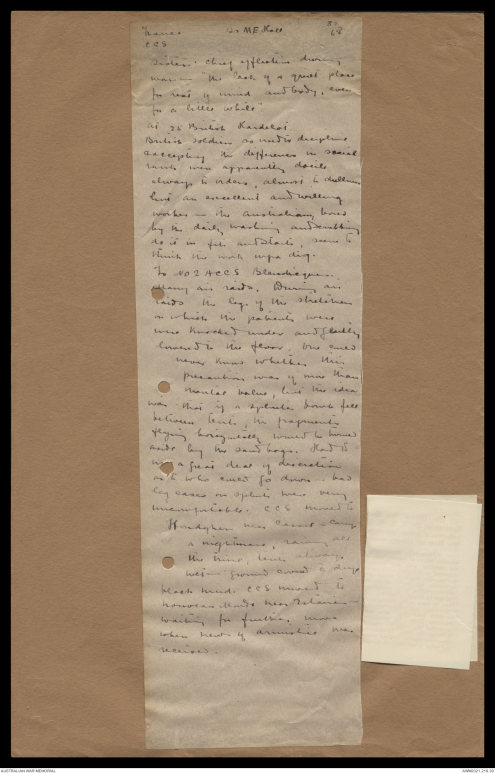
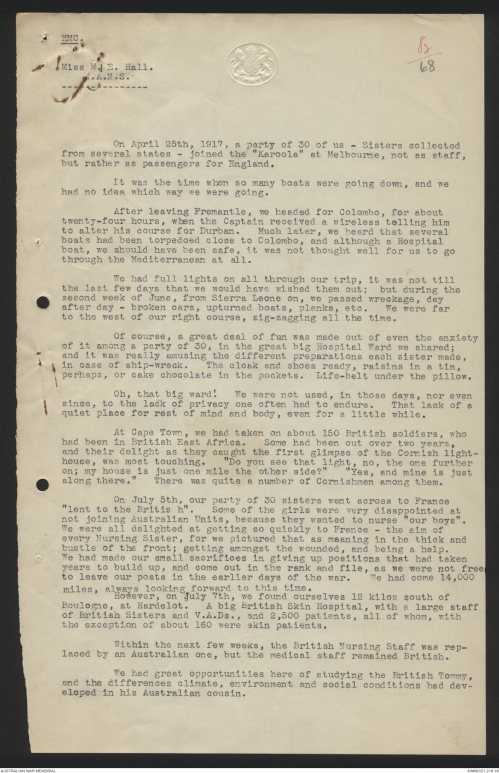
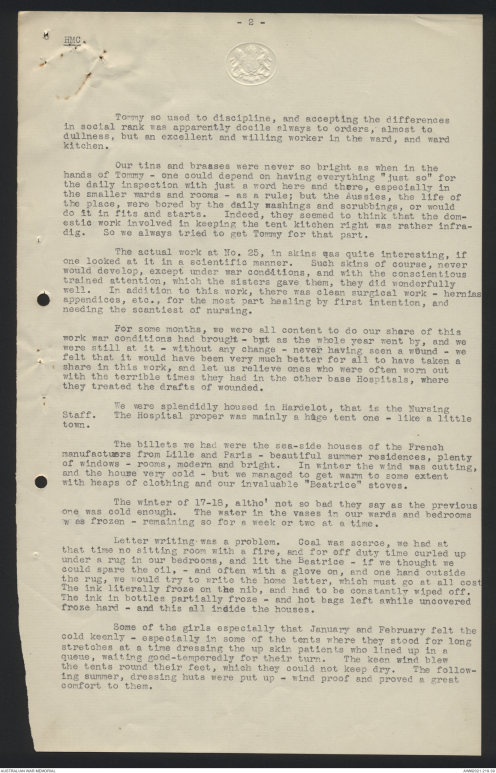
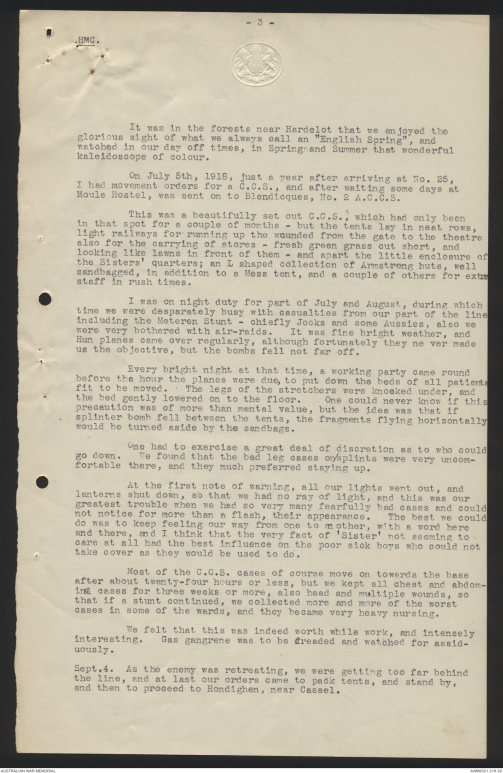
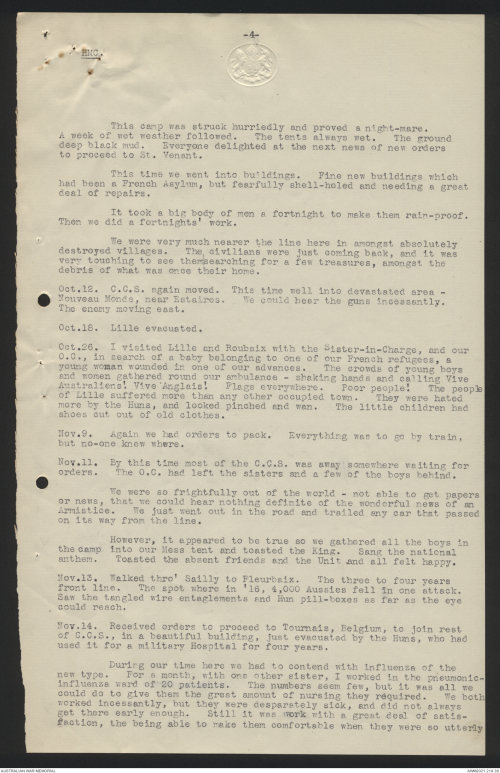
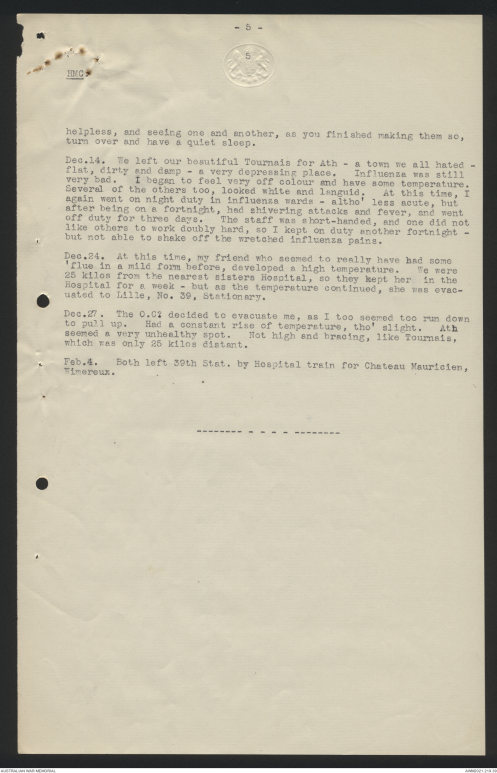
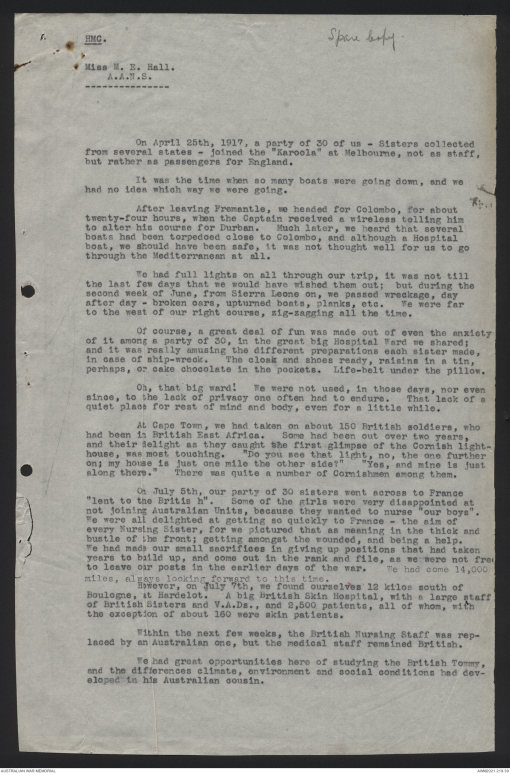
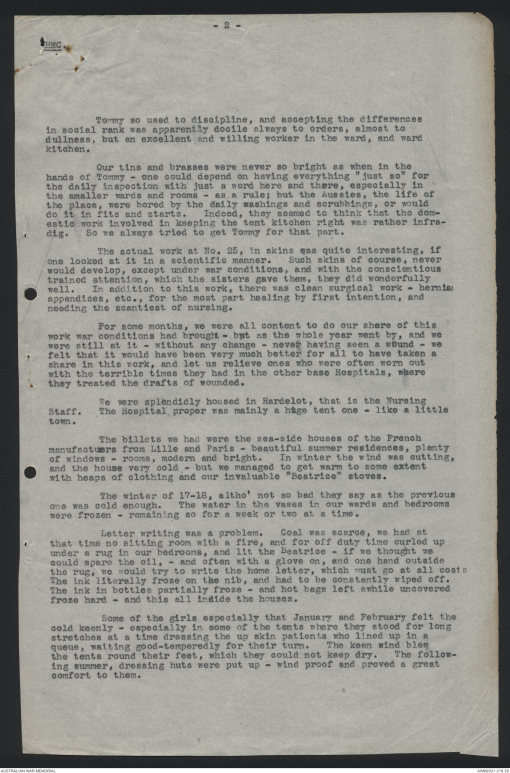
Butler Colln. 6/72
WAR OF 1914-18
AWM 4 1
AWM 4 1
AUSTRALIAN ARCHIVES
ACCESS STATUS
OPEN
SISTER M.E. HALL.
A.W.M.
LIBRARY
Classn No 373.2
(979)
The Official War Historian of the Commonwealth
Government (Dr. C. E. W. Bean), after his study of the
collection of private war records preserved in the Australian
War Memorial Library, wrote :
"The private diaries in this collection furnish some of its most
valuable historical records, but, like all private memoirs which were
not compiled with any historical purpose, they should not be
regarded as first-hand evidence except where it is certain that they
are so. The diarist is almost always sincere in his desire to record
accurately, but he is subject to no obligation or inducement to
indicate whether he is recording his own observations or incidents
told him by friends or heard as third or fourth hand at the mess-table.
Then, in some of the diaries in this collection, scenes described with
vivid detail and without any warning that they are told at second
or third hand have been found to be completely inaccurate in
important details. A certain number also have been written up
or revised long after the events, though doubtless usually from notes
made at the time. In most cases the student must rely on his
experiences and on internal evidence to guide him in judging what is
and what is not likely to be historically accurate."
Name &
C C S
Sr ME Hall
82/68
Sisters' chief afflictions during
war - "the lack of a quiet place
for rest of mind and body, even
for a little while"
At 25 British Hardelot
British soldiers so used to discipline
& accepting in differences in social
ranks were apparently docile
always in orders, almost to dullness
but an excellent and willing
worker - the Australian, bored
by the daily washing and scrubbing
as is in fits and starts, seems to
think this work infra dig.
To NO 2 ACCS Blendicques.
Many air raids. During air
raids the legs of the stretchers
on which the patients were
were knocked under and gently
lowered to the floor. We would
never know whether these
precautions was of more than
mental value, but the idea
was that if a splinter bomb fell
between the tents, the fragments
flying horizontally would be turned
aside by the sandbags. Had to
make a great deal of discretion
as to who could go down. Bad leg cases
on splints were very
uncomfortable. C C S moved to
Hondighen, near Cassel
a night-mare. raining all
the time, tents always
wet. The ground around - deep
black mud. C C S moved to
Nouveau Monde, near Estaires
waiting for further news
when news of armistice was
received.
HMC.
82/68
Miss M.E. Hall.
A.A.N.S.
On April 25th, 1917, a party of 30 of us - Sisters collected
from several states - joined the "Karoola" at Melbourne, not as staff,
but rather as passengers for England.
It was the time when so many boats were going down, and we
had no idea which way we were going.
After leaving Fremantle, we headed for Colombo, for about
twenty-four hours, when the Captain received a wireless telling him
to alter his course for Durban. Much later, we heard several
boats had been torpedoed close to Colombo, and although a Hospital
boat, we should have been safe, it was not thought well for us to go
through the Mediterranean at all.
We had full lights on all through our trip, it was not till
the last few days that we would have wished them out; but during the
second week of June, from Sierra Leone on, we passed wreckage, day
after day - broken oars, upturned boats, planks, etc. We were far
to the west of our right course, zig-zagging all the time.
Of course, a great deal of fun was made out of even the anxiety
of it among a party of 30, in the great big Hospital Ward we shared;
and it was really amusing the different preparations each sister made,
in case of ship-wreck. The cloak and shoes ready, raisins in a tin,
perhaps, or cake chocolate in the pockets. Life-belt under the pillow.
Oh, that big ward! We were not used, in those days, nor even
since, to the lack of privacy one often had to endure. That lack of a
quiet place for rest of mind and body, even for a little while.
At Cape Town, we had taken on about 150 British soldiers, who
had been in British East Africa. Some had been out over two years,
and their delight as they caught the first glimpse of the Cornish lighthouse,
was most touching. "Do you see that light, no, the one further
on; my house is just one mile the other side?" "Yes, and mine is just
along there." There was quite a number of Cornishmen among them.
On July 5th, our party of 30 sisters went across to France
"lent to the British". Some of the girls were very disappointed at
not joining Australian Units, because they wanted to nurse "our boys".
We were all delighted at getting so quickly to France - the aim of
every Nursing Sister, for we pictured that as meaning in the thick and
bustle of the front; getting amongst the wounded, and being a help.
We had made our small sacrifices in giving up positions that had taken
years to build up, and come out in the rank and file, as we were not free
to leave our posts in the earlier days of the war. We had come 14,000
miles, always looking forward to this time.
However, on July 7th, we found ourselves 12 kilos south of
Boulogne, at Hardelot. A big British Skin Hospital, with a large staff
of British Sisters and V.A.Ds., and 2,500 patients, all of whom, with
the exception of about 160 were skin patients.
Within the next few weeks, the British Nursing Staff was replaced
by an Australian one, but the medical staff remained British.
We had great opportunities here of studying the British Tommy,
and the differences climate, environment and social conditions
had developed in his Australian cousin.
-2-
HMC.
Tommy so used to discipline, and accepting the differences
in social rank was apparently docile always to orders, almost to
dullness, but an excellent and willing worker in the ward, and ward
kitchen.
Our tins and brasses were never so bright as when in the
hands of Tommy - one could depend on having everything "just so" for
the daily inspection with just a word here and there, especially in
the smaller wards and rooms - as a rule; but the Aussies, the life of
the place, were bored by the daily washings and scrubbings, or would
do it in fits and starts. Indeed, they seemed to think that the domestic
work involved in keeping the tent kitchen right was rather infradig.
So we always tried to get Tommy for that part.
The actual work at No. 25, in skins was quite interesting, if
one looked at it in a scientific manner. Such skins of course, never
would develop, except under war conditions, and with the conscientious
trained attention, which the sisters gave them, they did wonderfully
well. In addition to this work, there was clean surgical work - hernias
appendices, etc., for the most part healing by first intention, and
needing the scantiest of nursing.
For some months, we were all content to do our share of this
work war conditions had brought - but as the whole year went by, and we
were still at it - without any change - never having seen a wound - we
felt that it would have been very much better for all to have taken a
share in this work, and let us relieve ones who were often worn out
with the terrible times they had in the other base Hospitals where
they treated the drafts of wounded.
We are splendidly housed in Hardelot, that is the Nursing
Staff. The Hospital proper was mainly a huge tent one - like a little
town.
The billets we had were the sea-side houses of the French
manufacturers from Lille and Paris - beautiful summer residences, plenty
of windows - rooms, modern and bright. In winter the wind was cutting,
and the house very cold - but we managed to get warm to some extent
with heaps of clothing and our invaluable "'Beatrice" stoves.
The winter of 17-18, altho' not so bad they say as the previous
one was cold enough. The water in the vases in our wards
and bedrooms
w as frozen - remaining so for a week or two at a time.
Letter writing was a problem. Coal was scarce, we had at
that time no sitting room with a fire, and for off duty time curled up
under a rug in our bedrooms, and lit the Beatrice - if we thought we
could spare the oil, - and often with a glove on, and one hand outside
the rug, we would try to write the home letter, which must go at all cost
The ink literally froze on the nib, and had to be constantly wiped off.
The ink in bottles partially froze - and hot bags left while uncovered
froze hard - and this all inside the houses.
Some of the girls especially that January and February felt the
cold keenly - especially in some of the tents where they stood for long
stretches at a time dressing the up skin patients who lined up in a
queue, waiting good-temperedly for their turn. The keen wind blew
the tents round their feet, which they could not keep dry. The following
summer, dressing huts were put up - wind proof and proved a great
comfort to them.
-3-
HMC.
It was in the forests near Hardelot that we enjoyed the
glorious sight of what we always call an "English Spring", and
watched in our day off times, in Spring and Summer that wonderful
kaleidoscope of colour.
On July 5th, 1916, just a year after arriving at No. 25,
I had movement orders for a C.C.S., and after waiting some days at
Moule Hostel, was sent on to Blendicques, No.2 A.C.C.S.
This was a beautifully set out C.C.S., which had only been
in that spot for a couple of months - but the tents lay in neat rows,
light railways for running up the wounded from the gate to the theatre
also for the carrying of stores - fresh green grass cut short, and
looking like lawns in front of them - and apart the little enclosure of
the Sisters' quarters; an L shaped collection of Armstrong huts, well
sandbagged, in addition to a Mess tent, and a couple of others for extra
staff in rush times.
I was on night duty for part of July and August, during which
time we were desperately busy with casualties from our part of the line
including the Meteren Stunt - chiefly Jocks and some Aussies, also we
were very bothered with air-raids. It was fine bright weather, and
Hun planes came over regularly, although fortunately they ne ver made
us the objective, but the bombs fell not far off.
Every bright night at that time, a working party came round
before the hour the planes were due, to put down the beds of all patients
fit to be moved. The legs of the stretchers were knocked under, and
the bed gently lowered on to the floor. One could never know if this
precaution was of more than mental value, but the idea was that if
splinter bomb fell between the tents, the fragments flying horizontally
would be turned aside by the sandbags.
One had to exercise a great deal of discretion as to who could
go down. We found that the bad leg cases on/splints were
very uncomfortable
there, and they much preferred staying up.
At the first note of warning, all our lights went out, and
lanterns shut down, so that we had no ray of light, and this was our
greatest trouble when we had so very many fearfully bad cases and could
not notice for more than a flash, their appearance. The best we could
do was to keep feeling our way from one to another, with a word here
and there, and I think that the very fact of 'Sister' not seeming to
care at all had the best influence on the poor sick boys who could not
take cover as they would be used to do.
Most of the C.C.S. cases of course move on towards the base
after about twenty-four hours or less, but we kept all chest and abdominal
cases for three weeks or more, also head and multiple wounds, so
that if a stunt continued, we collected more and more of the worst
cases in some of the wards, and they became very heavy nursing.
We felt that this was indeed worth while work, and intensely
interesting. Gas gangrene was to be dreaded and watched for assiduously.
Sept.4. As the enemy was retreating, we were getting too far behind
the line, and at last our orders came to pack tents, and stand by,
and then to proceed to Hondighen, near Cassel.
-4-
HMC.
This camp was struck hurriedly and proved a night-mare.
A week of wet weather followed. The tents always wet. The ground
deep black mud. Everyone delighted at the next news of new orders
to proceed to St. Venant.
This time we went into buildings. Fine new buildings which
had been a French Asylum, but fearfully shell-holed and needing a great
deal of repairs.
It took a big body of men a fortnight to make them rain-proof.
Then we did a fortnights' work.
We were very much nearer in the line here in amongst absolutely
destroyed villages. The civilians were just coming back, and it was
very touching to see them searching for a few treasures, amongst the
debris of what was once their home.
Oct.12. C.C.S. again moved. This time well into devastated area -
Nouveau Monde, near Estaires. We could hear the guns incessantly.
The enemy moving east.
Oct.18. Lille evacuated.
Oct.26. I visited Lille and Roubaix with the Sister-in-Charge, and our
O.C., in search of a baby belonging to one of our French refugees, a
young woman wounded in one of our advances. The crowds of young boys
and women gathered round our ambulance - shaking hands and calling Vive
Australiens! Vive Anglais! Flags everywhere. Poor people! The people
of Lille suffered more than any other occupied town. They were hated
more by the Huns, and looked pinched and wan. The little children had
shoes cut out of old clothes.
Nov.9. Again we had orders to pack. Everything was to go by train,
but no-one knew where.
Nov.11. By this time most of the C.C.S. was away somewhere waiting for
orders. The O.C. had left the sisters and a few of the boys behind.
We were so frightfully out of the world - not able to get papers
or news, that we could hear nothing definite of the wonderful news of an
Armistice. We just went out in the road and trailed any car that passed
on its way from the line.
However, it appeared to be true so we gathered all the boys in
the camp into our Mess tent and toasted the King. Sang the national
anthem. Toasted the absent friends and the Unit and all felt happy.
Nov.13. Walked thro' Sailly to Fleurbaix. The three to four years
front line. The spot where in '16, 4,000 Aussies fell in one attack.
Saw the tangled wire entanglements and Hun pill-boxes as far as the eye
could reach.
Nov.14. Received orders to proceed to Tournais, Belgium, to join rest
of C.C.S., in a beautiful building, just evacuated by the Huns, who had
used it for a military Hospital for four years.
During our time here we had to contend with influenza of the
new type. For a month, with one other sister, I worked in the pneumonic-
influenza ward of 20 patients. The numbers seem few, but it was all we
could do to give them the great amount of nursing they required. We both
worked incessantly, but they were desperately sick, and did not always
get there early enough. Still it was work with a great deal of satisfaction,
the being able to make them comfortable when they were so utterly
-5-
HMC.
helpless, and seeing one and another, as you finished making them so,
turn over and have a quiet sleep.
Dec.14. We left our beautiful Tournais for Ath - a town we all hated -
flat, dirty and damp - a very depressing place. Influenza was still
very bad. I began to feel very off colour and have some temperature.
Several of the others too, looked white and languid. At this time, I
again went on night duty in influenza wards - altho' less acute, but
after being on a fortnight, had shivering attacks and fever, and went
off duty for three days. The staff was short-handed, and one did not
like others to work doubly hard, so I kept on duty another fortnight -
but not able to shake off the wretched influenza pains.
Dec.24. At this time, my friend who seemed to really have had some
'flue in a mild form before, developed a high temperature. We were
25 kilos from the nearest sisters Hospital, so they kept her in the
hospital for a week - but as the temperature continued, she was evacuated
to Lille, No. 39, Stationary.
Dec.27. The O.C? decided to evacuate me, as I too seemed too run down
to pull up. Had a constant rise of temperature, tho' slight. Ath
seemed a very unhealthy spot. Not high and bracing, like Tournais.
which was only 25 kilos distant.
Feb.4. Both left 39th Stat. by Hospital train for Chateau Mauricien
Wimereux.
Spare Copy
HMC.
Miss M.E. Hall.
A.A.N.S.
On April 25th, 1917, a party of 30 of us - Sisters collected
from several states - joined the "Karoola" at Melbourne, not as staff,
but rather as passengers for England.
It was the time when so many boats were going down, and we
had no idea which way we were going.
After leaving Fremantle, we headed for Colombo, for about
twenty-four hours, when the Captain received a wireless telling him
to alter his course for Durban. Much later, we heard several
boats had been torpedoed close to Colombo, and although a Hospital
boat, we should have been safe, it was not thought well for us to go
through the Mediterranean at all.
We had full lights on all through our trip, it was not till
the last few days that we would have wished them out; but during the
second week of June, from Sierra Leone on, we passed wreckage, day
after day - broken oars, upturned boats, planks, etc. We were far
to the west of our right course, zig-zagging all the time.
Of course, a great deal of fun was made out of even the anxiety
of it among a party of 30, in the great big Hospital Ward we shared;
and it was really amusing the different preparations each sister made,
in case of ship-wreck. The cloak and shoes ready, raisins in a tin,
perhaps, or cake chocolate in the pockets. Life-belt under the pillow.
Oh, that big ward! We were not used, in those days, nor even
since, to the lack of privacy one often had to endure. That lack of a
quiet place for rest of mind and body, even for a little while.
At Cape Town, we had taken on about 150 British soldiers, who
had been in British East Africa. Some had been out over two years,
and their delight as they caught the first glimpse of the Cornish lighthouse,
was most touching. "Do you see that light, no, the one further
on; my house is just one mile the other side?" "Yes, and mine is just
along there." There was quite a number of Cornishmen among them.
On July 5th, our party of 30 sisters went across to France
"lent to the Britis h". Some of the girls were very disappointed at
not joining Australian Units, because they wanted to nurse "our boys".
We were all delighted at getting so quickly to France - the aim of
every Nursing Sister, for we pictured that as meaning in the thick and
bustle of the front; getting amongst the wounded, and being a help.
We had made our small sacrifices in giving up positions that had taken
years to build up, and come out in the rank and file, as we were not free
to leave our posts in the earlier days of the war. We had come 14,000
miles, always looking forward to this time.
However, on July 7th, we found ourselves 12 kilos south of
Boulogne, at Hardelot. A big British Skin Hospital, with a large staff
of British Sisters and V.A.Ds., and 2,500 patients, all of whom, with
the exception of about 160 were skin patients.
Within the next few weeks, the British Nursing Staff was replaced
by an Australian one, but the medical staff remained British.
We had great opportunities here of studying the British Tommy,
and the differences climate, environment and social conditions had developed
in his Australian cousin.
-2-
HMC.
Tommy so used to discipline, and accepting the differences
in social rank was apparently docile always to orders, almost to
dullness, but an excellent and willing worker in the ward, and ward
kitchen.
Our tins and brasses were never so bright as when in the
hands of Tommy - one could depend on having everything "just so" for
the daily inspection with just a word here and there, especially in
the smaller wards and rooms - as a rule; but the Aussies, the life of
the place, were bored by the daily washings and scrubbings, or would
do it in fits and starts. Indeed, they seemed to think that the domestic
work involved in keeping the tent kitchen right was rather infradig.
So we always tried to get Tommy for that part.
The actual work at No. 25, in skins was quite interesting, if
one looked at it in a scientific manner. Such skins of course, never
would develop, except under war conditions, and with the conscientious
trained attention, which the sisters gave them, they did wonderfully
well. In addition to this work, there was clean surgical work - hernias
appendices, etc., for the most part healing by first intention, and
needing the scantiest of nursing.
For some months, we were all content to do our share of this
work war conditions had brought - but as the whole year went by, and we
were still at it - without any change - never having seen a wound - we
felt that it would have been very much better for all to have taken a
share in this work, and let us relieve ones who were often worn out
with the terrible times they had in the other base Hospitals where
they treated the drafts of wounded.
We are splendidly housed in Hardelot, that is the Nursing
Staff. The Hospital proper was mainly a huge tent one - like a little
town.
The billets we had were the sea-side houses of the French
manufacturers from Lille and Paris - beautiful summer residences, plenty
of windows - rooms, modern and bright. In winter the wind was cutting,
and the house very cold - but we managed to get warm to some extent
with heaps of clothing and our invaluable "'Beatrice" stoves.
The winter of 17-18, altho' not so bad they say as the previous
one was cold enough. The water in the vases in our wards and bedrooms
were frozen - remaining so for a week or two at a time.
Letter writing was a problem. Coal was scarce, we had at
that time no sitting room with a fire, and for off duty time curled up
under a rug in our bedrooms, and lit the Beatrice - if we thought we
could spare the oil, - and often with a glove on, and one hand outside
the rug, we would try to write the home letter, which must go at all cost
The ink literally froze on the nib, and had to be constantly wiped off.
The ink in bottles partially froze - and hot bags left while uncovered
froze hard - and this all inside the houses.
Some of the girls especially that January and February felt the
cold keenly - especially in some of the tents where they stood for long
stretches at a time dressing the up skin patients who lined up in a
queue, waiting good-temperedly for their turn. The keen wind blew
the tents round their feet, which they could not keep dry. The following
summer, dressing huts were put up - wind proof and proved a great
comfort to them.
HMC. -
 Sam scott
Sam scottThis transcription item is now locked to you for editing. To release the lock either Save your changes or Cancel.
This lock will be automatically released after 60 minutes of inactivity.